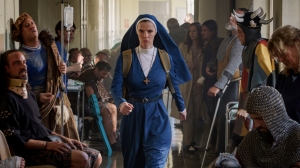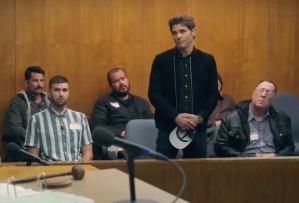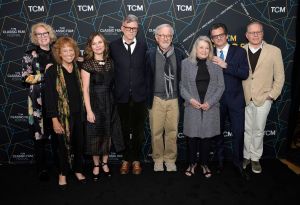A column chronicling events and conversations on the awards circuit.
The final hours are upon us.
This isn’t meant to be some sort of bleak apocalyptic statement, but rather a catchy reminder to my fellow Emmy voters that time is fleeting when it comes to casting your nominating ballot. In fact we are now entering the last weekend of voting with all ballots due by 10pm PT on Monday.
This means the busy campaigning of the last six months of Phase One will grind to a halt. I guess that also means no more home visits from nuns delivering Buffalo Wings courtesy of Mrs. Davis. Damn!
Judging from casual conversations, I would make an educated guess that a good number of the 20,000+ eligible voters have yet to make their choices, and no wonder. The sheer volume of content out there is staggering so you want to be as responsible as you can and see as much as you can before putting those check marks down.
There has been reporting this week about how the TV Academy will deal with the WGA strike and potential SAG strike in terms of the Emmy calendar, and the early fall dates of the three ceremonies, particularly the Primetime Emmys on Fox on September 18 as it now stands (and it is the all-important 75th Emmys!), but all of that is clearly a wait and see. Right now Emmy voters are focused on the nuts and bolts of choosing the nominees.
I checked out my ballot just before writing this column and dutifully spent about a half hour voting on the 21 categories in which I qualify (six for writing, which is my branch, and another 15 for programs which everyone gets to vote on). At the top of the ballot Television Academy members are warned that the game has changed this year and there are limits on the number of slots you can check off. It is no longer open season, no more voting for as many as you like.
In my case that meant up to 8 for Drama and Comedy Series, which happens to be the number of shows that can now be nominated in those categories, but only 5 for Limited Series, a bountiful field I keep advocating to expand to match the aforementioned Drama and Comedy nominees.
SMART CAMPAIGN STRATEGIES?

HBO
At any rate, it has been interesting to see the campaigns play out this year. Before the deadline to submit names for individual categories there was much speculation about placement. And – SPOILER ALERT – after Logan Roy was shockingly killed off in Episode 3 of the fourth and final season of Succession, a Janet Leigh Psycho-level surprise if ever there was one, pundits immediately surmised star Brian Cox, nominated two previous times for Lead Actor Drama Series as Roy, but never a winner in the role, might change things up and go Supporting, or even into the far less daunting Guest Actor Drama Series (5 or less episodes make you eligible there). This talk could be one of the reasons previous two-time Supporting Actor nominee Kieran Culkin decided to challenge co-star Jeremy Strong (a past winner) by moving up to the Lead Actor category.
However, crafty Cox (or HBO) waited until the last minute to reveal Logan Roy was still in charge and opted to once again compete in Lead Actor, a very smart move because no matter what the actual screen time, the character and his demise dominated conversation all season.
So now we have Cox, Strong, and Culkin potentially in a head-to-head-to-head race, assuming voters go for all three there. Unless they cancel each other out, I wouldn’t be shocked to see Cox pull out a win as a tip of the hat to his work on the entire series.

Jennifer Coolidge Getty Images
FREDERIC J. BROWN/AFP via Getty Images
Sarah Snook, like Culkin, also chose to move into the Lead Actress race after two times at bat – and losing – in Supporting, but that seemed a natural move because she really is the female lead in that series. That leaves a less-imposing field to run against presumed front-runners Jennifer Coolidge and Rhea Seehorn in Supporting Actress Drama Series. Both had been subject to speculation about their respective final seasons (presumably for Coolidge, unless she comes back in a rumored prequel) of The White Lotus and Better Call Saul.
Last season Coolidge won Supporting Actress Limited Series for her first go round with Lotus, but because hers was the only character brought back for Season 2 the Academy rejected producer appeals and jettisoned Lotus into Drama Series. There had been speculation that Coolidge would choose to go Lead but the ensemble nature of the show really argues against that. She was right to stay where she is.
The same is true of Seahorn who (at last and so deservedly) finally got a nomination for Better Call Saul in 2022, but some thought she might try for lead in its final turn at bat. The speculation didn’t bear fruit or make much sense since this year’s Saul is really just the second half of Season 6. She stayed put and now has her last chance in the role — if voters can remember all the way back to last summer when the acclaimed series played out its final six episodes.
WRITING’S ON THE WALL

Getty Images
With the WGA strike still in full swing, writers are top of mind these days, as they should be because nothing happens without them. So I thought it would be interesting to see how they have been navigating the Emmy game, especially in terms of placement, always a strategic chess match when it comes to entering scripts for series.
How many from each show? Which ones? Do you have a better chance just entering one or multiple choices? It can go either way.
Mad Men, for instance, dominated with three of five final nominees for Writing in a Drama Series after multiple submissions one year, but it can be tricky. Some shows, even major contenders, don’t want to confuse matters.

Mrs. Davis Peacock
Sophie Kohler/PEACOCK
Succession, the series many pundits expect to dominate, has only entered a single episode, a strategy that suggests they are going for the win, and appears to be the way creator Jesse Armstrong likes to play the game with writing (it got three nominations in directing).
Similarly one of its main competitors, Mike White’s The White Lotus, also submitted just one Season 2 script, “Arrivederci.”
In that same category, the Better Call Saul brain trust has entered five of their eligible six scripts. Last year’s winner for Writing in a Comedy Series, Abbott Elementary has entered three this season, but The Conners, a show never nominated for much of anything, found five to be Emmy worthy, or so they think.
In Limited Series, Peacock’s hopeful freshman Mrs. Davis has entered five of its eight episodes (and again Peacock thank you and the nun you hired to deliver those Buffalo Wings), while the clearly-in-denial kids show Ms. Marvel entered all six of theirs. The latter is the series with the single-biggest total of entries, unless you count the procedurals like Law & Order and The FBI, which submitted six entries apiece across their various franchises.
LIMITED OPTION

It can all be a crap shoot. The late breaking sensation, Jury Duty is trying to get noticed in the uber-competitive Outstanding Comedy Series traffic jam. Producers of that show tell me they have no plans at the moment to do a second season, and it would be hard to imagine how they could, considering the hidden camera component and nature of the brilliantly funny and inventive eight-episode series. I think they could have opted to put it in Limited Series where it might have had a better chance to stand out despite being a (less than) half-hour comedy series. We’ll soon know if their strategy turns out to be a successful one.
Netflix’s Beef is also just ten half-hour episodes. It could have gone a different way, but did decide in the end to enter as a Limited Series, rather than either Comedy or Drama. You could really make an argument for all three, so we will see if that strategy succeeds.
Nominations are scheduled to be announced on Tuesday July 12th.
OSCAR SEASON STARTS WITH TELLURIDE HOLLYWOOD PARTY

Meanwhile, believe it or not, Oscar season is lurking around the corner, a fact made plain by Wednesday night’s Pendry Hotel West Hollywood bash celebrating the upcoming 50th Annual Telluride Film Festival.
Telluride, which takes place over Labor Day weekend, is of course one of the three Fall Fests, along with Venice and Toronto, that signal the start of the movie awards season. The annual June kickoff event in Los Angeles was packed, and as one awards pundit told me, “I always love this party because you can totally get clues as to what movies are going to Telluride just by seeing which studios show up here.” True. And there were reps out in force from the likes of Searchlight, Focus Features, Roadside Attractions, Sony Pictures Classics, Netflix, Amazon Studios, and many more, so take your guesses.
Telluride keeps its lineup secret until the charter flight takes off from LAX headed to the Rocky Mountains for the four-day festival (actually five days this year due to the 50th milestone), but it is always a prime showcase for Oscar hopefuls.
SAVING TCM

From left: Kathleen Finch, Cass Warner, Pola Changnon, Paul Thomas Anderson, Steven Spielberg, Angie Dickinson, Ben Mankiewicz and David Zaslav at TCM Classic Film Festival
TCM
Much of the talk at the Telluride Hollywood bash was not about which potential movies might be going, but what David Zaslav is doing to beloved TCM, the Warner/Discovery owned classic movie channel whose key executives became a victim of studio cutbacks this week.
As Deadline reported, no less than Steven Spielberg, Paul Thomas Anderson and Martin Scorsese all got on the phone with Zaslav on Wednesday to express their concern about what he is doing to the channel that he has publicly and enthusiastically supported since taking over the Warner ship.
Initial reports of the filmmakers’ calls to Zaslav indicated they were encouraged by what they heard from the studio chief, but whether that saves jobs or not is another question. Today’s news that Warners’ Michael DeLuca and Pam Abdy will be taking over oversight of TCM is certainly heartening for the film community.
It was a bit ironic this was all happening as Telluride was celebrating, since TCM started its own Classic Movie Film Festival over a decade ago and modeled it after Telluride. It even had Telluride’s co-founders as consultants. The execs now being pushed out at TCM are the heart and soul of that April fest and without them, it is hard to imagine it continuing.
As esteemed film historian and critic Leonard Maltin said Wednesday, “Please say it ain’t so”.
People still matter in this business. A.I. can’t do it all.

